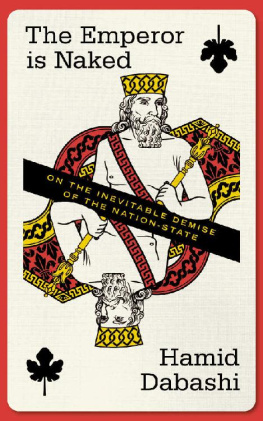Clare ODea
The Naked Swiss
A Nation Behind 10 Myths
The Naked Swiss
A Nation Behind 10 Myths
Clare ODea
Bergli Books
Copyright 2016 Bergli Books,
an imprint of Schwabe Publishing, Basel, Switzerland
All rights reserved. No part of this publication may be reproduced,
stored in a retrieval system, or transmitted in any form, or by any means,
electronic, mechanical, photocopying, recording or otherwise,
without prior permission in writing from Bergli Books, CH-4010 Basel.
eBooks by Schwabe AG, Muttenz
ISBN 978-3-905252-90-3
ISBN (epub) 978-3-905252-91-0
ISBN (mobi) 978-3-905252-92-7
With the support of the Swiss Arts Council Pro Helvetia
For Thomas
Authors note
No person leaves himself behind in order to look at a painting, Siri Hustvedt writes in Mysteries of the Rectangle. Our experience of the artwork depends on who we are, on our character.
The same can be said of our experience of a country. No one arrives as a blank slate. We come with expectations and prejudices, our own norms and preferences. Adapt or resist? Rage or submit?
Because I am independent by nature, integration into Swiss life often felt like a process of compromise for me. What made the process ultimately successful and rewarding was how my life was enriched by positive experiences and relationships. For what is a country but its people? Through my decade as a journalist in Switzerland, I had the opportunity to cast the net wide. I met Swiss people from every corner of society from the most powerful to the most marginalised, the most brilliant to the bravest. In my non-professional life, as a wife, a mother, a friend, a commuter, a hospital patient, a hairdressers client and a dog walker, day by day, person by person, I have got to know the real Swiss.
Youve heard the clichs. In this book I chose what I found to be the ten most prevalent assumptions about the Swiss. The time has come to separate myth from misunderstanding.
Clare ODea
August 2016
Fribourg, Switzerland
Chapter 1
The Swiss Are Swiss
When the Swiss are not busy being wonderful, they are busy being awful. By any tangible measure of success, looking at factors like health, wealth or achievement, the Swiss are world leaders. They have the lowest obesity rates in Western Europe and the second-longest average life expectancy in the world, at 85 years for women and 80 for men. The quality of life in the Swiss cities of Zurich, Geneva and Bern is repeatedly ranked among the best worldwide. Smaller towns have the same attributes of clean air, low crime, excellent public transport and good governance. Year after year Switzerland secures a place at or near the top of global surveys in all sorts of categories, from innovation to wellbeing and prosperity, from nurturing talent to looking after the environment. The Swiss have won 25 Nobel Prizes and lead the world in the number of patent applications and scientific publications per capita. Through the International Committee of the Red Cross they have fought the good fight against the savagery of war. Based on financial and property assets, Swiss households have an average fortune of over half a million francs, more than any other nationality. To cap it all, they even came first in the United Nations World Happiness Report.
All this good news has to compete with more negative developments: the countrys two largest banks and more than 80 other Swiss banks disgraced and fined in the United States for facilitating tax evasion; the Singapore branch of BSI bank shut down in May 2016 over serious breaches of money laundering requirements, the first merchant bank to lose its licence in the city-state in more than 30 years; popular votes to ban the construction of minarets and to automatically deport foreign criminals, including Swiss-born offenders; the ongoing FIFA shenanigans; not to mention countless money trails leading from the worlds worst kleptocrats and oppressors to the polished marble lobbies of Swiss private banks. The criticism doesnt stop at hard news. Particularly in the English-speaking world, but also among Germans, there is a great appetite for arent they strange cultural commentary stories about the Swiss. As a general rule, any piece that makes the Swiss appear ridiculous or sinister, or both, is welcome. The result is a caricature of the cat-eating, obsessively recycling, robotically-dull and silly rule-making Swiss that has been so carefully constructed over years that it may never be dismantled. Its tough being the rich kid of Europe.
Somewhere behind all this excellence and questionable behaviour is a complex and interesting people, resistant to simple stereotyping. The Swiss are peace-loving but they own more guns than anyone in Europe, bar the Serbians. The Swiss are rich, and yet they have the lowest rate of home-ownership in the industrialised world. They stand accused of xenophobia and being insular but every fourth person living in Switzerland is foreign-born. Swiss women had to wait longer than their European sisters for key rights but they have the highest rate of workforce participation in Europe, and the lowest abortion rate, coupled with relaxed abortion laws. Though the Swiss are neutral, they are involved behind the scenes in numerous international conflicts. The Swiss are boring (the Financial Times will tell you why happy is boring), but they have a great sex life (if you believe the Durex Sexual Wellbeing Survey).
Stellar rankings in the Global Innovation Index, the Legatum Prosperity Index, the Country Brand Index, the IMD World Talent Report, the Global Competitiveness Index and the Environmental Performance Index, to name but a few, show the bright and shining nation Swiss officialdom wants us to see. The Swiss care what other countries think of them. Since 1970, successive acts of parliament have been introduced to ensure large amounts of time and money are invested in promoting Switzerlands image abroad and supporting the stimulation of positive feelings towards Switzerland. The Federal Department of Foreign Affairs has a unit dedicated to nation branding abroad, Presence Switzerland (annual budget eight million francs), which implements the governments communication strategy, and organises a strong marketing presence at major international events, such as World Expos or Olympic Games. The brand used for these events is House of Switzerland, which can take different forms. At the Sochi Winter Olympics in 2014, for example, a 730-square-metre transportable wooden guest centre was erected, showcasing Swiss innovation and products. The budget for the Swiss presence in Sochi was three million francs. The Swiss venue in the fan zone at the football World Cup in Rio de Janeiro boasted 240,000 visitors the same year. Evidently the government feels it is getting a good return from these promotional exercises. Some six million francs were earmarked for the 2016 Summer Olympics in Rio where the 4,100-square-metre Swiss space featured three houses and a park.













